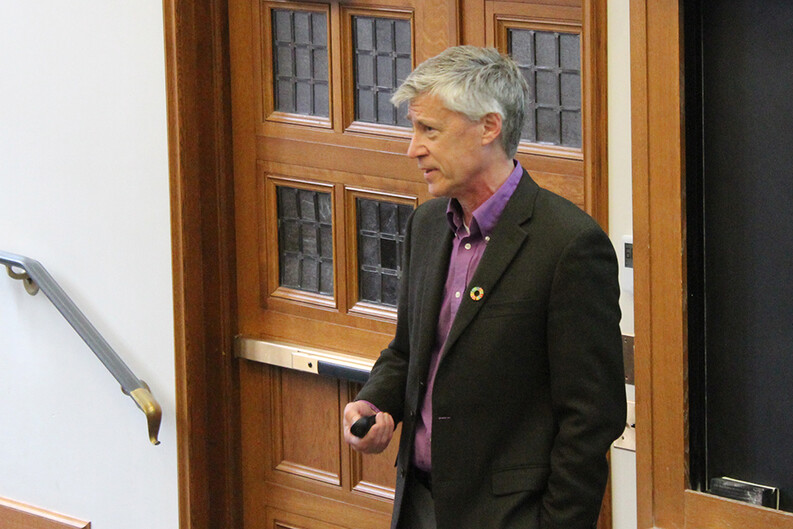First U.N. Independent Expert on Human Rights and the Environment Recounts His Work

John H. Knox, Henry C. Lauerman Professor of International Law at Wake Forest University, led the March 2 Human Rights Workshop4, “Climate Change and U.N. Human Rights Bodies.” The workshop centered on Knox’s tenure as the first U.N. Special Rapporteur on human rights and the environment from 2012 to 2018.
In his talk, Knox highlighted three key tenets of applying human rights norms to climate change: that climate change interferes with the enjoyment of a vast range of human rights, that states therefore have an obligation to protect people against the effects of climate change, and that U.N. human rights institutions must provide forums to hear human rights-based climate cases.
Adapting a quote by fiction writer William Gibson, Knox said: “Climate change is already here. It’s just unevenly distributed.”
According to Knox, the first case before the United Nations alleging that climate change threatens human rights was filed in 2005 on behalf of the Inuit people before the Inter-American Commission. The petition in Sheila Watt-Cloutier et al. v. the United States of America sought relief from climate-related human rights violations that were caused by the United States. Though it did not proceed, Knox said the case illustrated how the adverse effects of climate change have disproportionately affected marginalized communities around the world.
In 2012, the U.N. appointed Knox the first Independent Expert on human rights and the environment with the mandate to study the issue and report on it. Knox told how he also used his position to urge those negotiating and drafting what would become the Paris Agreement to include about human rights.
“Human rights and the environment share an interdependent relationship and the law reflects this relationship,” Knox said.
Since 1994, Knox noted, human rights bodies have been “greening” human rights, apply rights to life and health in the environment context. But it wasn’t until Knox wrote his final report in 2018 that he explicitly called on the U.N. Human Rights Council to recognize the human right to a healthy environment.
According to Knox, recognizing this right creates an undeniable obligation for states to mitigate, adapt, and respond to climate change. The Paris Agreement, for example, requires that states adopt mitigation measures necessary to keep the global temperature increase below two degrees Celsius. Though Knox expressed concerned about a “gap between what is necessary and what is promised,” he was optimistic about the utility of human rights in the fight for climate justice.
“Paris may not be binding, but human rights law is,” Knox said. “If states don’t take the steps to reduce the risk of catastrophic consequences, then they are violating human rights obligations, and we can take these violations to human rights bodies.”
Moreover, Knox explained, states also have obligations to adopt effective adaptation measures to protect against environmental harm. He cited the example of Maldives, one of the lowest-lying island nations, constructing seawalls to protect its communities from rising sea levels. In addition, he said, states are also obligated to ensure that their response actions uphold human rights. Builders of hydroelectric dam in Guatemala have been accused of major human rights violations.
“Even if a dam makes sense for climate change...you can’t expel Indigenous peoples from their homes and you can’t shoot them if they protest,” Knox stressed.
Knox also emphasized the importance of framing climate change as a human rights issue, spotlighting recent cases that do so. In Teitiota v. New Zealand, a citizen of the island nation of Kirabati appealed a denial of refugee status, arguing that the effects of climate change are forcing citizens to leave Kirabati. In Sacchi, et al. v. Argentina, et al., 16 children filed a petition alleging that several countries violated their rights under the United Nations Convention on the Rights of the Child by failing to sufficiently curb greenhouse gases.
Knox called particular attention to Torres Strait Islanders v. Australia, which went before the U.N. Human Rights Committee in 2022. In this landmark case indigenous Torres Islanders claimed that Australia had violated their human rights by failing to adapt to climate change. In a historic decision, the Human Rights Committee agreed.
“This sets a really important precedent because you can make that argument for just about any country in the world,” Knox said.
Despite climate change’s continued grave threats to human rights, Knox concluded his workshop on a note of hope. In 2022, the U.S. supported the creation of a new human right by the U.N. for the first time since 1948. The U.N. recognized that right: the right to a healthy environment.


